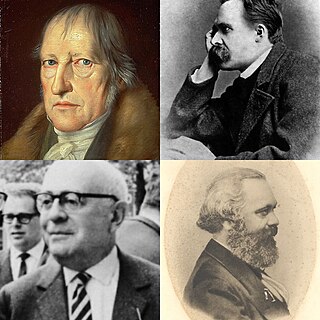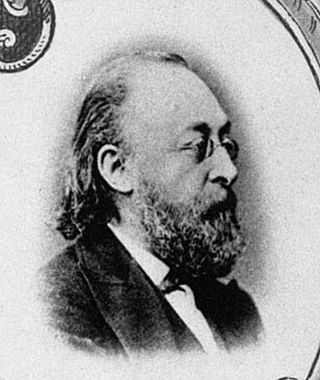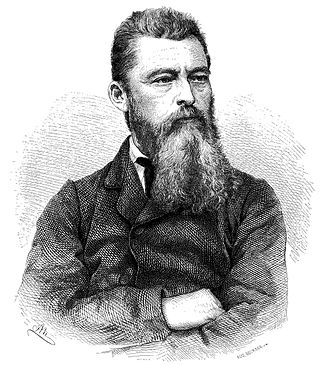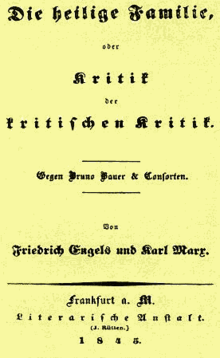
Karl Marx was a German-born philosopher, economist, political theorist, historian, sociologist, journalist, and revolutionary socialist. His best-known works are the 1848 pamphlet The Communist Manifesto and the three-volume Das Kapital (1867–1894); the latter employs his critical approach of historical materialism in an analysis of capitalism and is the culmination of his intellectual efforts. Marx's ideas and theories and their subsequent development, collectively known as Marxism, have exerted enormous influence on modern intellectual, economic and political history.

Friedrich Engels was a German philosopher, political theorist, historian, journalist, and revolutionary socialist. He was also a businessman and Karl Marx's closest friend and collaborator.

Bruno Bauer was a German philosopher and theologian. As a student of G. W. F. Hegel, Bauer was a radical Rationalist in philosophy, politics and Biblical criticism. Bauer investigated the sources of the New Testament and, beginning with Hegel's analysis of Christianity's Hellenic as well as Jewish roots, concluded that early Christianity owed more to ancient Greek philosophy (Stoicism) than to Judaism.

Johann Kaspar Schmidt, known professionally as Max Stirner, was a German post-Hegelian philosopher, dealing mainly with the Hegelian notion of social alienation and self-consciousness. Stirner is often seen as one of the forerunners of nihilism, existentialism, psychoanalytic theory, postmodernism and individualist anarchism.

German philosophy, meaning philosophy in the German language or philosophy by German people, in its diversity, is fundamental for both the analytic and continental traditions. It covers figures such as Gottfried Wilhelm Leibniz, Immanuel Kant, Georg Wilhelm Friedrich Hegel, Karl Marx, Friedrich Nietzsche, Martin Heidegger, Ludwig Wittgenstein, the Vienna Circle, and the Frankfurt School, who now count among the most famous and studied philosophers of all time. They are central to major philosophical movements such as rationalism, German idealism, Romanticism, dialectical materialism, existentialism, phenomenology, hermeneutics, logical positivism, and critical theory. The Danish philosopher Søren Kierkegaard is often also included in surveys of German philosophy due to his extensive engagement with German thinkers.
The opium of the people or opium of the masses is a dictum used in reference to religion, derived from a frequently paraphrased partial statement of German revolutionary and critic of political economy Karl Marx: "Religion is the opium of the people." In context, the statement is part of Marx's analysis that religion's role is as a metaphysical balm for the real suffering in the universe and in society.

The Right Hegelians, Old Hegelians (Althegelianer), or the Hegelian Right were those followers of German philosopher Georg Wilhelm Friedrich Hegel in the early 19th century who took his philosophy in a politically and religiously conservative direction. They are typically contrasted with the Young Hegelians, who interpreted Hegel's political philosophy as supportive of left-wing and progressive politics or views on religion.
"On the Jewish Question" is a response by Karl Marx to then-current debates over the Jewish question. Marx wrote the piece in 1843, and it was first published in Paris in 1844 under the German title "Zur Judenfrage" in the Deutsch–Französische Jahrbücher.

Critique of Hegel's Philosophy of Right is a manuscript written by the German political philosopher Karl Marx in 1843 but unpublished during his lifetime—except for the introduction, published in Deutsch–Französische Jahrbücher in 1844. In the manuscript, Marx comments on excerpts of Georg Wilhelm Friedrich Hegel's 1820 book Elements of the Philosophy of Right that deal with 'civil society' and the state paragraph by paragraph. One of Marx's major criticisms of Hegel in the document is the fact that many of his dialectical arguments begin in abstraction.

Influences on Karl Marx are generally thought to have been derived from three main sources, namely German idealist philosophy, French socialism and English and Scottish political economy.
Edgar Bauer was a German political philosopher and a member of the Young Hegelians. He was the younger brother of Bruno Bauer. According to Lawrence S. Stepelevich, Edgar Bauer was the most anarchistic of the Young Hegelians, and "...it is possible to discern, in the early writings of Edgar Bauer, the theoretical justification of political terrorism." German anarchists such as Max Nettlau and Gustav Landauer credited Edgar Bauer with founding the anarchist tradition in Germany. In the mid-1840s, Marx' and Engels' critique of the Bauer brothers marked the beginning of their collaboration and an important stage in the development of Marxist thought. Edgar Bauer participated in the Revolution of 1848. Subsequently he became a conservative.
Neue Marx-Lektüre or NML is a revival and interpretation of Karl Marx's critique of political economy, which originated during the mid-1960s in both Western and Eastern Europe and opposed both Marxist–Leninist and social democratic interpretations of Marx. Neue Marx-Lektüre covers a loose group of authors primarily from German-speaking countries who reject certain historicizing and empiricist interpretations of Marx's analysis of economic forms, many of which are argued to spring from Friedrich Engels role in the early Marxist workers' movement.

Karl Theodor Ferdinand Grün, also known by his alias Ernst von der Haide, was a German journalist, philosopher, political theorist and socialist politician. He played a prominent role in radical political movements leading up to the Revolution of 1848 and participated in the revolution. He was an associate of Heinrich Heine, Ludwig Feuerbach, Pierre-Joseph Proudhon, Karl Marx, Mikhail Bakunin and other radical political figures of the era.

The correct place of Karl Marx's early writings within his system as a whole has been a matter of great controversy. Some believe there is a break in Marx's development that divides his thought into two periods: the "Young Marx" is said to be a thinker who deals with the problem of alienation, while the "Mature Marx" is said to aspire to a scientific socialism.

Ludwig Andreas von Feuerbach was a German anthropologist and philosopher, best known for his book The Essence of Christianity, which provided a critique of Christianity that strongly influenced generations of later thinkers, including Charles Darwin, Karl Marx, Sigmund Freud, Friedrich Engels, Mikhail Bakunin, Richard Wagner, and Friedrich Nietzsche.
The following is a list of the major events in the history of German idealism, along with related historical events.
Classical Marxism is the body of economic, philosophical, and sociological theories expounded by Karl Marx and Friedrich Engels in their works, as contrasted with orthodox Marxism, Marxism–Leninism, and autonomist Marxism which emerged after their deaths. The core concepts of classical Marxism include alienation, base and superstructure, class consciousness, class struggle, exploitation, historical materialism, ideology, revolution; and the forces, means, modes, and relations of production. Marx's political praxis, including his attempt to organize a professional revolutionary body in the First International, often served as an area of debate for subsequent theorists.

The German Ideology, also known as A Critique of the German Ideology, is a set of manuscripts written by Karl Marx and Friedrich Engels around April or early May 1846. Marx and Engels did not find a publisher, but the work was retrieved and first published in 1932 by the Soviet Union's Marx–Engels–Lenin Institute. The book uses satirical polemics to critique modern German philosophy, particularly that of young Hegelians such as Marx's former mentor Bruno Bauer, Ludwig Feuerbach, and Max Stirner's The Ego and Its Own. It criticizes "ideology" as a form of "historical idealism", as opposed to Marx's historical materialism. The first part of Volume I also examines the division of labor and Marx's theory of human nature, on which he states that humans "distinguish themselves from animals as soon as they begin to produce their means of subsistence".

The Young Hegelians, or Left Hegelians (Linkshegelianer), or the Hegelian Left, were a group of German intellectuals who, in the decade or so after the death of Georg Wilhelm Friedrich Hegel in 1831, reacted to and wrote about his ambiguous legacy. The Young Hegelians drew on his idea that the purpose and promise of history was the total negation of everything conducive to restricting freedom and reason; and they proceeded to mount radical critiques, first of religion and then of the Prussian political system. They rejected anti-utopian aspects of his thought that "Old Hegelians" have interpreted to mean that the world has already essentially reached perfection.
Marxist philosophy or Marxist theory are works in philosophy that are strongly influenced by Karl Marx's materialist approach to theory, or works written by Marxists. Marxist philosophy may be broadly divided into Western Marxism, which drew from various sources, and the official philosophy in the Soviet Union, which enforced a rigid reading of what Marx called dialectical materialism, in particular during the 1930s. Marxist philosophy is not a strictly defined sub-field of philosophy, because the diverse influence of Marxist theory has extended into fields as varied as aesthetics, ethics, ontology, epistemology, social philosophy, political philosophy, the philosophy of science, and the philosophy of history. The key characteristics of Marxism in philosophy are its materialism and its commitment to political practice as the end goal of all thought. The theory is also about the struggles of the proletariat and their reprimand of the bourgeoisie.











